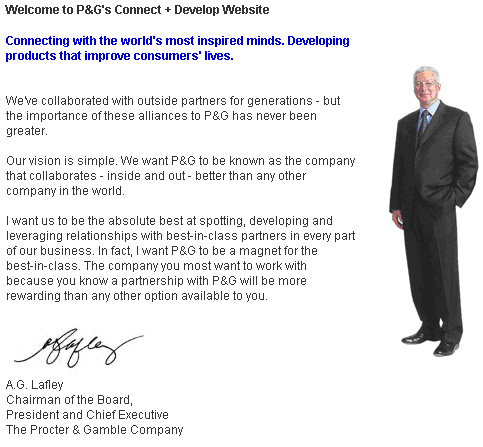The BRIC countries (Brazil, Russia, India, and China) represent the fastest growing markets in the world. But consumers there are the “unserved” today as they simply don’t have the income to afford Western goods and service. So, who will serve them and tap this huge market? While others keep their focus on U.S. and other affluent Western markets, innovators from the BRIC countries themselves are flying under the radar, not just to imitate, but to innovate to reach the billions of unserved and underserved. For example, India’s Novatium touts its $100 network PC as “computing for the next billion.”
Here are some of the other companies that may just become the largest companies no one has ever heard of: Haier (Chinese brand in household appliances, #3 globally in refrigerators), Embraer (Brazilian producer of jet aircraft for regional markets), High Tech Computer Corp. (Taiwanese designers of sophisticated, converged hand-held devices: smart phones and PDAs), Lenovo (#3 global computer maker) and Hyundai Heavy Industries (Korean shipbuilder, the world’s largest)
While acknowledging the risks inherent in any start-up venture, Indian Internet pioneer, Rajesh Jain speaks eagerly of what he calls the phenomenon of the black swan – rare, but not impossible, event. “Google was a black swan,” he said. “No one expects the next Microsoft or Intel or Cisco to come out of India, but I believe it is entirely possible.”
If you are “one in a million” in India, there are 1,100 people just like you. The top 25% of the Indian population with the highest IQs is almost equal to the total population of America. Caveat so-called “knowledge worker,” which were supposed to be America’s competitive advantage. While General Motors notes that $1,500 of the costs that go into each new vehicle it manufacturers is for employee health care, India’s Tata motors is making a $2,000 car. The message here is that all is changed, changed utterly, in the world of business with the opening up of China, India and the former Soviet Union bringing three-billion new capitalists into the marketplace.
Kiran Mazumdar-Shaw is founder, chairman and managing director of the Bangalore-based Biocon Ltd. Biocon is determined to be India’s Genentech by 2010. When Biocon produces life-saving pharmaceuticals that the people at the bottom of the economic pyramid (the third world) can afford, watch out BigPharma, for Biocon will go global with their low-cost, high-quality drugs. Hmm, we would do well to rephrase the so-called “third world” to “emerging markets,” as innovations created there will go global – it’s called blowback. And, not just BigPharma, but Big Incumbents in most industries had better watch their backs.

Oh, and did you know the Chinese car maker, Chery, plans to introduce a luxury car in the U.S. in 2008 that just could disrupt the luxury car market with its eye-catching low cost? It won’t be a junk imitation. In its relentless pursuit of quality, Chery hired a Japanese engineer from Mitsubishi to head its Lean/Six Sigma production systems. Chery adopted DURR Paint Systems in their paint shop in 2004, becoming one of only 5 factories in the world to have this advanced system. In 2005, Chery was upgraded to ISO/TS 16949:2002 production quality, the highest and strictest quality control system in the global auto industry. Chery’s innovations that meet the demand for high-quality, low cost cars in China and other emerging markets is poised to become another poster child for the notion of blowback.

What Does It All Mean?
All this means that, as Aronica and Ramdoo write in their book, The World is Flat?, globalization is the greatest reorganization of the world since the Industrial Revolution. It means that you and your company must get ready for extreme competition. It means you can no longer take anything for granted. It means extreme competitors have their eyes on your customers. It means taking a fresh new look at what innovation means, which, in turn means innovating innovation itself, from product-driven, inside-out R&D style innovation to outside-in customer-driven innovation. It means you no longer are a producer ‘selling’ to your customers, you become a ‘buyer’ for your customers, going to the ends of the earth to find the innovations your customers demand. To win at the game of innovation in the 21st century, you must become so close to your customers that you can anticipate their needs even before they do. And the only way you can do that is to connect and collaborate with your customers, helping them to improve their business processes, the ways they get work done, the ways they solve problems, the ways they satisfy their ever-changing, never-satisfied needs.
Proctor and Gamble has a stated goal that 50% of it’s innovations will come from outside the company’s legendary R&D labs. To meet the ever-changing needs of its customers, P&G intends to “connect and collaborate” with innovators across the globe. P&G operates an interactive technology marketplace with yet2.com, a Web-based global forum for buying and selling technology. For P&G, the fabled brand master, all is changed, changed utterly, from inside-out, to outside-in.
>
What to Do? What to Do? Learn from the multinationals in emerging economies. They practice the ancient Chinese Sun Tzu Art of War strategy of focusing on niche markets ignored by so-called market leaders. If you make stuff, become an outsourcer to emerging multinationals instead of an outsourcee. That is, sell your components to emerging multinationals such as appliance maker Haier or aircraft maker Embraer, not just current big-name U.S. manufacturers. In short, stay under the radar and quietly build global brands, for it’s the three billion new capitalist in the BRIC countries that represent the greatest market growth potential. In short, this means becoming a superspecialist that the whole world will want to tap. On the other hand, learn form P&G and look beyond your current in-house resources or suppliers for innovation. Tap the superspecialists across the globe to bring continuous innovation to your customers. Be both a outsourcer and an outsourcee, with ‘superspecialization’ as the defining criterion in either mode of operation.
In order to do all this, either on the buy-side or the sell-side, you’ll need to master business process innovation to “connect and collaborate” in the brave new world of total global competition. That’s precisely where Business Process Management (BPM) and the advanced capabilities of Human Interaction Management (HIM) come in, for you cannot just pick up the phone or send an email to “connect and collaborate.”
The days of episodic change, where your father’s innovation meant decades of market dominance from a single innovation, are over. Today, it’s the pace of innovation that counts, and your company must position itself directly at the crossroads of innovations your customers demand, and the innovations a new world of suppliers can provide. Position your company as today’s black swan. Become a rare, but not impossible, enterprise.
To visualize this connection between innovation and BPM, watch the 6-minute screencast, Shift Happens, at:
















